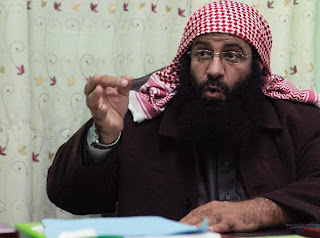 |
| Fijian servicemen in Sinai |
At that time, we quoted Field Marshal Mohammed Hussein Tantawi, the head of Egypt's military government, declaring that security in the Sinai Peninsula was "100% under control... The security situation in Sinai is 100% safe".
We also noted [5-Apr-12: The terrorists send us their Passover greetings] that Egypt's chief of security made two uncompromising statements in the wake of the pre-Passover rocket attacks on Israel. One - they didn't come from Egyptian territory. And two - in case anyone might have thought that there were security issues in the Sinai, well - there aren't.
In the past few minutes, there are reports that the Fijian peacekeepers are free again (fair warning: with so much confusion down there, we're not sure what is really happening):
Anyone with eyes can see Sinai is not safe. It's a place that presents serious and obvious challenges for the Egyptians and also for us, given the long border we have with Egyptian Sinai. It has been the scene of repeated pipeline bombings, attacks on Egyptian police, attacks on Israelis and all of this against a background in which the sounds emanating from Cairo and its newly empowered Islamist politicians have caused deep disquiet among Israelis of every stripe.
Tonight we had indications that the Egyptian authorities are seriously out of their depth and that Sinai is getting worse and more worrying:
Bedouin have kidnapped 10 Fijian members of an international peacekeeping force in Egypt's Sinai Peninsula, security sources [quoted by the BBC] say. The kidnappers are reportedly demanding the authorities release from prison several fellow tribesmen, some of whom have been convicted of terrorism... The MFO is an independent force formed to monitor the borders between Egypt and Israel following the 1979 peace accord. It consists of military staff from 12 countries including the US and France. "They were patrolling and we seized them by firing in the air," one of the kidnappers told the AFP news agency. "They are with us now, and we want the liberation of all Bedouin prisoners..." Such incidents have increased in frequency since the overthrow of the former President Hosni Mubarak last year.
 |
| This Salafist was detained for 8 years under Mubarak. Today free, he heads the Islamic religious courts in northern Sinai. Reuters caption reads: "With Mubarak's removal from power, the government authority has collapsed in much of Sinai with the Islamists taking over" [Source] |
"Bedouins in Egypt's Sinai Peninsula released 10 Fijian members of a multinational peacekeeping force they had kidnapped earlier on Monday to try to secure the release of fellow tribesmen from prison, Egyptian security sources said. The Multinational Force and Observers (MFO) could not immediately be reached for comment. The remote Sinai region has descended further into lawlessness since a popular uprising ousted Egypt's president more than a year ago and threw the security apparatus into disarray. [Source]A Reuters backgrounder on Sinai, published some weeks ago, puts some facts around those concerns:
The group of 50 young men who had blocked off access to a small international military base in the Sinai desert would say nothing of who they were but their appearance held a few clues. Dressed in army fatigues and armed with AK-47s, they wore the long beards of the hardline Islamists who are increasingly a law unto themselves in this part of Egypt. Quietly, barely noticed by outsiders fascinated by upheavals in Cairo and other Arab capitals, they are building a presence in Sinai that might offer a new haven for anti-Western militancy at the strategic junction of the Mediterranean, Africa and Asia.Lawlessness, disarray, a haven for anti-Western "militancy". Just the things that are lacking in this region.









